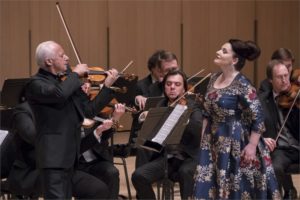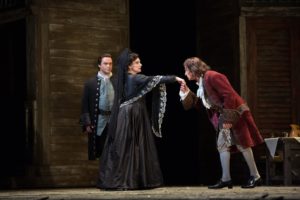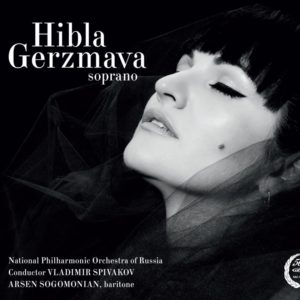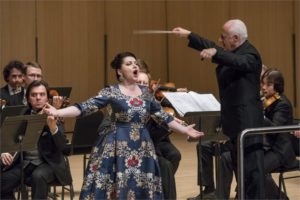 |
| Looking up at the Komische Oper. (Photo: mine. Please do not reproduce without permission.) |
Trips to Berlin always seem like a whirlwind. My first visit in January was essentially just that, part of a larger two-week European winter opera jaunt that also included explorations through Belgium and France. In the four nights I spent in Berlin this past winter, I ensured visits to the Komische Oper, Deutsche Oper, and of course, the Berlin Philharmonic, even as temperatures dropped and Siberian winds made me glad to have brought my mukluks and wooly sweaters.
Returning to Berlin in spring, visits to productions by these organizations were a foregone conclusion, but because I had the luxury of more time this particular jaunt, I included others as well (notably the Staatsoper Berlin, as well as NYC’s Metropolitan Opera, at the very end), which yielded a bouquet of thought-provoking experiences. Of the panoply of cultural riches I experienced over the course of my recent two week trip, what connected everything, and stands out in retrospect, were incredible performances by women. Longing, love, loneliness, intimacy, identity, community — all of these themes were covered, in moving, creative ways that felt all too familiar and close at times. Each performer embarked on different types of journeys that would intersect, move apart, race in parallel lines, only to twist and turn again. Looking for love, finding love, rejecting love; looking for self, finding self, reinventing self; seeking kindred spirits, finding those spirits leaving or being abandoned by them — all this, plus narratives of dedication, deception, and rejection, helped to elevate the performances I saw from mere entertainment into real (and very familiar, for me) human experience. Despite the cool and rainy Berlin spring, there was something warming about all of it. That isn’t to say everything I saw was comforting, though some of it was certainly entertaining.
The work of Komische Oper left a strong impression, visually, sonically, and theatrically. This fine company (which translates literally as “comic opera,” though the work it presents isn’t strictly comedic) impressed me during my previous visit, when I attended opening night of its whimsical double-bill production (working together with British production outfit 1927) of Stravinsky’s Petrushka and Ravel’s L’enfant et les sortilèges. Vibrancy, color, and imagination, together with a deep respect for the scores and great, rave performances, left me wanting more.
Returning to Berlin, I saw three productions at the Komische, which is located just steps from the famous Brandenburg Gate. Ball im Savoy (Ball At The Savoy) is a fun, naughty 1932 operetta by Paul Abraham, a Jewish-Hungarian composer who enjoyed immense success in the 1930s with a string of musical hits and big screen adaptations. Originally presented by the KOB in 2013 as director Barry Kosky’s closing work to mark his first season as Chief Director for the company, this was a fantastic, uproarious production, filled with solid performances, beautiful designs, and smart commentary on the nature of human relating, particularly within the sometimes complicated sphere of sexual intimacy.
 |
L-R Katharine Mehrling, Dagmar Manzel, and Christiane Oertel in Ball im Savoy.
Photo: Iko Freese / drama-berlin.de |
I especially appreciated the casting and performance of Dagmar Manzel a well-known, deeply entertaining German actor who, like many artists in Berlin, goes totally against the Hollywood aesthetic of young, cute, and Instagram-hot; Manzel is pushing sixty, broad-shouldered and large of laugh, with a raspy, sexy, low voice and a a wonderfully confident stage presence. What a treat it would be to see her live again; Manzel is an eminently watchable performer, who ably delivered a smart, nuanced performance playing Madeleine, the just-married wife of Aristide (Christoph Späth), a man with a past, and who seemed frequently more attached to his fear than to his wife. The scenes between the two crackled with a spicy, natural chemistry and volcanic verve. As Opera News reviewer A.J. Goldmann noted in his 2013 review of Ball im Savoy, “Not only is the KOB an ideal forum for rescuing such works from obscurity; the works themselves — and the worthy productions they come packaged in — add immeasurably to the company’s luster.” No kidding.
Manzel will appear at Komische Oper next season in two productions, both of which I’m keen to see: as the lead in the 1923 musical Die Perlen der Cleopatra (The Pearls of Cleopatra) by Oscar Straus, in a production directed by Barry Kosky (which she’s also doing this July as part of the KOB’s Summer Festival); and in another Straus work, this one from 1932, helmed again by Australia-born director, Eine Frau, die weiß, was sie will! (A Woman Who Knows What She Wants!). The latter will be staged this fall, when I am planning on possibly making a return visit to Berlin, so… stay tuned.
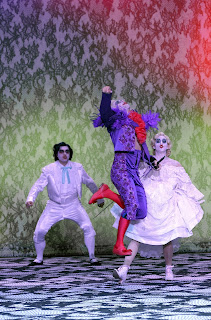 |
Gunter Papendell as Don Giovanni.
Photo: Monika Rittershaus |
More color and entertainment at the Komische came in the form of a very surreal, commedia dell’arte-influenced staging of Mozart’s Don Giovanni, which was sung in German, a choice which I found myself initially stunned at sonically, but grew to eventually appreciate, even adore. Very purposely leaving the lyricism, romance, and poetry of the original behind, director Herbert Fritsch, together with conductor Jordan de Souza, produced a raucously entertaining spectacle that, while not offering any emotionally moving moments for me personally, did offer a bold canvas onto which Fritsch painted his garish vision.
Philipp Meierhofer’s Leporello, costumed in baggy black but clearly embodying a Pulcinella-style characterization and presentation, was the sort of wise man figure to Günter Papendell’s Don Giovanni, a lithe, foppish figure with clear visual references to the Joker and, more directly, German actor Conrad Veitch in cinema classic The Man Who Laughs. Singing a feisty, sexy, diva-tastic Donna Elvira was Nina Bernsteiner, whose steaming middle voice and glassy tones perfectly reflected both Fritsch’s opera buffa-first approach, as well as the earthy nature of the woman behind, or perhaps physically manifesting, the fabulously grand Victoria Behr-designed yellow gown; Elvira wasn’t playing at being a needy diva, she simply was a True Actual Diva (and she made sure her purple-suited Lothario knew it). From its surreal opening, featuring assorted smashings, to the indelible image — Giovanni’s outstretched hand — of its sudden close (a nod to Mozart’s alternate ending), this was a strong vision for a work that aways provokes strong opinions. Was I moved? Not especially. Did I have a new appreciation for the characters? Yes. Was I entertained as all hell? You bet. Sometimes it’s nice to see something you thought you knew very well, to be surprised by it in new ways, and find out there is still yet more to discover; this was one of those moments.
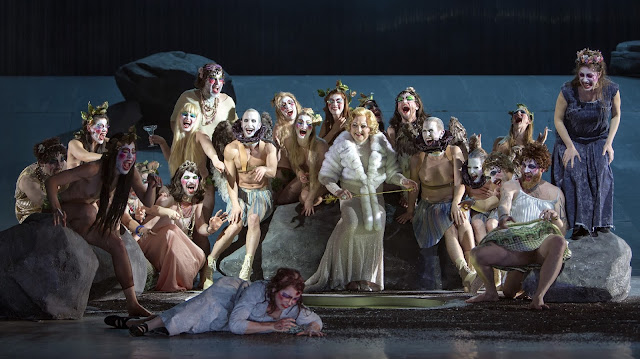 |
| Peter Renz, Katazyna Wlodarczyk, Talya Libermann. Photo: Iko Freese / drama-berlin.de |
This year being the 450th birthday of Claudio Monteverdi (an important moment for opera), I couldn’t resist seeing The Coronation of Poppea (Die Kronung der Poppea), the third Komische production I attended, and easily the one that left the strongest impression. I’m going to be exploring this work, and the KOB’s very sexy, very disturbing production in a future post which will feature the talented German baritone Dominik Köninger (who sings Nero in the show), but suffice for now to say that of the seven operas I saw in Berlin, this one has stayed with me the most. The story of the Emperor Nero, of his decadent world, and his ruthless murder of Seneca (Jens Larsen), his casual tossing-aside of wife Octavia (Karolina Gumos) and his lust for (and with) Poppea (Alma Sadé), were staged with class, intelligence, and vision. That’s not to say there weren’t some shocking scenes; Nero’s coterie includes some fully nude celebrants (male and female), and Seneca’s murder featured both frontal male nudity and a copious (/ disturbing) amount of (stage) blood.
Monteverdi’s original, stately score has been given a very creative re-working by composer Elena Kats-Chernin that features modern instrumentation (the orchestra includes a banjo!) and the transposition of not only instruments but roles (including Nero, from a counter-tenor to a baritone), bringing a new-meets-old sound that places firm emphasis on music as storytelling, and perfectly matches Director Barry Kosky’s decadent, stylish production and Music Director Matthew Toogood’s detailed approach. Presented as a remount for the KOB (Poppea is part of a Monteverdi cycle by the company, originally done in 2012), the piece kept a perfect respect for Monteverdi’s original vision while contemporizing its subtext; there was something alarmingly timely (and of course, timeless) about the ruthlessness and greedy ambition of its sordid cast of characters, and, led by Köninger’s snarling, sexy, utterly magnetic performance this was a coronation that felt, at times, far too close. I’m not sure I’ve seen anything so highly charged on an opera stage in a long time. More on this one soon, but for now, in a word: WOW.
 |
| Curtain calls for La Traviata. Photo: mine (via). Please do not reproduce without permission. |
There were more big “wow” moments this trip, too. Verdi’s La Traviata was given a high-concept treatment that made liberal use of sand (truth: if I see another heavily symbolic, time-is-running-out-for-Violetta production, I will scream) but the singing, specifically that of Ailyn Perez in the lead, and Simone Piazzola as Giorgio Germont, was gorgeous. Her rendering of “Sempre Libera” (“Always Free”) specifically, was defiant, almost angry, a nice contrast to the puffy, cute, la-la-la interpretations I’ve seen over many decades now. (I kept hearing Perez’s version play, over and over, in my head on the plane ride home, in fact.) Soprano Perez’s Violetta was indeed defiant, angry, — and also, I felt, tired: tired of her life, tired of the fake people around her and the phony relationships, tired of the obsessive little boys she attracts. Her scenes with baritone Piazzola, in particular, brimmed with humanity, and highlighted an intriguing subtext, that perhaps Violetta had met her equal not with Alfredo (tenor Abdellah Lasri), but with his father. There was an emotional rawness to the charged, dramatic scene between Germont Sr. and Violetta, where he comes to beg her to break things off with his son for the sake of his family’s reputation. Piazzola (who sang the role in a circus-themed production directed by Roland Villazon in 2015) offered a poetic portrayal of a man who’d perhaps had fatherhood foisted onto him far too young, and who had little to no real relationship with the son whose reputation he wants to protect. These were wonderfully alive, complex, human performances, and I am looking forward to seeing more of Perez and Piazzola sing again soon. (Ernani at La Scala next September is certainly tempting, if a bit far off!)
 |
| Cristina Pasaroiu as Magda in Deutsche Oper’s production of La Rondine. Photo: Bettina Stöß (via) |
Other performers I’m looking forward to seeing and hearing again are soprano Cristina Pasaroiu, a beautiful, bell-toned lead in Puccini’s beautiful La Rondine (The Swallow) at Deutsche Oper, and soprano Dorothea Röschmann, whose portrayal of the Countess in the Staatsoper’s Le nozze di Figaro (The Marriage of Figaro) was one of the most honest portrayals I’ve ever witnessed. Both performers gave truly memorable performances, with Pasaroiu providing a lovely focal point for Rolando Villazon’s gorgeous, colorful production of Puccini’s 1916 work, and delivering a searing rendition of the famous “Chi il bel sogno di doretta” aria. Confession: I ruined my mascara at Pasaroiu’s interpretation; she captured the deep longing at the heart of this aria so, so perfectly. (Saturday night’s alright for crying, clearly.) Even standing still, watching Ruggero (Vincenzo Costanzo) in a club, or leaving him at the opera’s close, Pasaroiu said so much with such simple, elegant body language; I got the impression, in watching her, that she would have been a great silent film star. The Romanian soprano projects such rich poetry with her every gesture (and in Rondine‘s case, a beautiful sadness), which clearly translates vocally, something conductor Roberto Rizzi Brignoli sensed at a very intrinsic level, particularly with his careful shaping of the string section.
Another conductor with a very deep sense of relationship with his performers, Pablo Heras Casado, led a buoyant if equally thoughtful orchestra in Jurgen Flimm’s very funny (if occasionally tiresome) production of Le nozze di Figaro (The Marriage of Figaro) at the Staatsoper Berlin, a remount of a production from November 2015, with the same cast intact. Heras-Casado kept all the drama and tension (particularly hierarchical ones) of the original play (by Pierre Beaumarchais) fully intact, employing a rhythmic undercurrent that powered the score while keeping players inspired to provide a true heartbeat, and some needed counterpoint, to the slapstick-like follies and shenanigans that characterized much of Flimm’s production.
 |
Anna Prohaska and Dorothea Röschmann in Staatsoper Berlin’s Le nozze di Figaro.
Photo: Staatsoper Berlin / Clarchen and Matthias Baus (via) |
Dorothea Röschmann, reprising her role as Countess Almaviva, offered the most authentic characterization I may have ever seen Hers was a woman who loves, or wants to love, deeply, who is deeply saddened at the way her position, and the ridiculous behaviour of her husband the Count (Ildebrando D’Arcangelo), by extension, has separated her from this desired intimacy. Röschmann proved her acting chops in small but powerful ways; the way she gazed at Cherubino (a fantastic Marianne Crebassa) at points, the way she squeezed her eyes shut and swallowed her words in admitting to the Count who was hiding in the closet, the way she looked at him when the great reveal finally happened — all were highly theatrical moments that offered small slices of humanity amidst a zany comic staging. Her’s “Dove sono i bei momenti“(“Where are they, the beautiful moments”) was lushly voiced and achingly human, her scenes with Susanna (a sparky Anna Prohaska) brimming with vitality. This was a smart, nuanced, adult portrayal, and even with the nearly non-stop comedy that filled Flimm’s production, Röschmann’s Countess came off as authentic, sincere, and truly, deeply heartbroken, even at the opera’s end, when all is supposedly forgiven.
 |
Renee Fleming at the curtain call
for Der Rosenkavalier at the Metropolitan Opera.
Photo: mine. Please do not reproduce without permission. |
This post about my latest opera travels wouldn’t be at all complete without briefly exploring its incredible conclusion: experiencing Renée Fleming and Elina Garanča at the Metropolitan Opera in the penultimate performance of Der Rosenkavalier for the season. Seeing the two singers together in what amounted to a beautiful exploration of love, loss, aging, and acceptance felt like the apotheosis of a trip that carried with it strong undercurrents of disappointment and sadness, but also discovery and quiet renewal. I felt tears brimming listening to Fleming, especially as her character, the Marschallin moved between ponderings on the capricious nature of men (“Da geht er hin…” / “There he goes…“ ) and her relationship with the young Octavian (Garanča), to the inevitable (and cruel) passing of time (“Die Zeit, die ist ein sonderbar Ding” / “Time, it is a weird thing“) at the end of the first act. She didn’t just act the role of the aging, glamorous Marschallin here, or churn out something mediocre, maudlin, or in any way predictable; she was living her soul, bearing it, live, in front of the Metropolitan Opera audience, and it was breathtaking to behold.
 |
Tired but happy me in Berlin. (via)
Photo: mine. Please do not reproduce without permission. |
Fleming’s signature creamy soprano was lilting, spinning, soaring, twisting and arching, and joined with Garanča’s gorgeous, chocolate-toned mezzo in a seemingly effortless series of tiny tornados that spun in, around and through the audience. Both women were fiercely confident and utterly loving in their embrace of Strauss’ poetic score, and fully committed to Robert Carsen’s beautiful vision of a world about to completely vanish, in both micro and macro ways; these ladies surely vanished into their respective roles, musically, dramatically, spiritually. Bye composer, bye mascara… by God, bravissime!
I’m saving my symphony-going experiences for a future post, but suffice (for now) to say that seeing conductors Mariss Jansons, Herbert Blomstedt, and Daniel Barenboim live was very special; I had my mind changed about Sibelius and Bruckner in ways I never thought would happen. Danke Berlin…. Danke NYC… you ladies especially made it very beautiful, very memorable, and very worth every tube of mascara. Wahrheit!
